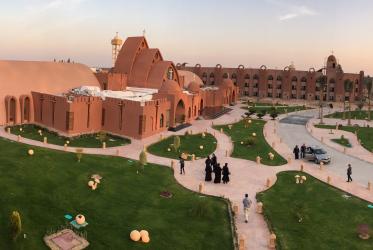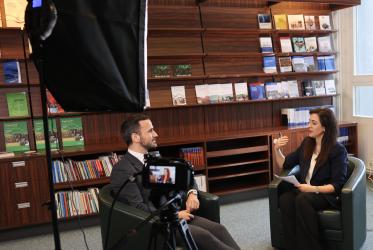World Council of Churches
COMMISSION ON FAITH AND ORDER
Faith and Order Plenary Commission
Kuala Lumpur, Malaysia
28 July - 6 August 2004
MESSAGE TO THE CHURCHES
Meeting as the Faith and Order plenary commission of the World Council of Churches assembled in Kuala Lumpur, Malaysia, 28 July - 6 August 2004, we send greetings to our brothers and sisters in churches throughout the world. The plenary commission consists of 120 members representing a very broad spectrum of churches, including almost all confessions. As the most representative Christian theological forum in the world, the commission has a unique role in assisting the churches' search for unity.
Taking place in Kuala Lumpur and beautifully hosted by the Council of Churches of Malaysia, our meeting helped us to appreciate the Christian presence and witness of our sisters and brothers in this land. The youngest of Southeast Asia's capitals, Kuala Lumpur enjoys an ethnic and cultural mix of Malay, Indian, Chinese, and Indigenous peoples, felt throughout the city in food, conversations, and the courtesy and welcome shown to visitors. There can be few better places to encounter members of different faiths striving to live together harmoniously in a majority Muslim society. We were welcomed to Malaysia by Prime Minister Abdullah Ahmad Badawi who highlighted the importance of interfaith dialogue and invited us to call upon all people of goodwill to work together for peace and justice. "We cannot stand before a compassionate God," he said, "while there is so much we have left undone because we are disunited. There is so much we could do, having received one another, to receive others."
The theme of our meeting, "Receive one another, as Christ received you, for the glory of God" (Romans 15:7), invited us to reflect on our common obligation to welcome one another, to look beyond our divisions and to work together for the visible unity of the Church. The new General Secretary of the WCC, Rev. Dr Samuel Kobia, gave a thoughtful introduction to our theme. In further discussions, we were challenged both by the doctrinal and historical divisions among the churches and by the estrangements between races, women and men, rich and poor, ethnic and national groups. Here, we recognized the importance of our mutual acceptance in Christ. Through the mystery of the incarnation, Christ assumes the whole of human nature. As our very identity is a gift from God, we are called to follow this example: "Let the same mind be in you that was in Christ Jesus" (Philippians 2:5). A spirituality of welcome, of reception, of hospitality, is central to the self-understanding of those who identify themselves as Christian.
At the beginning of the twenty-first century, we look towards the future with an awareness of our achievements and shortcomings in the quest for Christian unity. It is within this context that we, as the plenary commission of Faith and Order, have undertaken our current work. As we dealt with five specific Faith and Order studies, we welcomed the progress made, noted some of the remaining obstacles, and identified future steps.
The study on baptism logically occupied the first place on our agenda. Our exchanges challenged us to see the implications and the limitations of the present degree of our mutual recognitions of baptism. And, since baptism is a primary basis of ecumenism, it demands that we work towards a common understanding of the Church. Our discussions confirmed the importance of Faith and Order's study of the nature and mission of the Church. There are still many questions we need to explore together but we became aware of reaching a moment of hope, having identified a framework which might enable churches to move forward in terms of mutual recognition. Other ecclesiological work from the Special Commission on Orthodox Participation in the WCC, together with an ecclesiological statement being prepared for the Council's Ninth Assembly in 2006, will need to be taken into account.
The divisions within and among our churches reflect not only theological and ecclesiological differences, but also strife within the human community. We therefore welcome our commission's more recently initiated studies which have these issues clearly in view. One seeks to explore theologically the implications of Christian faith for the role of the churches in situations of ethnic and national conflict. Another examines the Christian understanding of the human person created in the image of God. A further study on ecumenical hermeneutics calls us to listen carefully and patiently to one another as we respond to the truth of the Gospel, and helps us to appreciate the riches of interpretations of Scripture within various traditions and contexts. Our theme of "receiving one another" resonates with all of these important studies.
In addition to reflection on these five studies, the plenary commission took the opportunity to engage in other important projects under the auspices of Faith and Order. Well-established work on the Apostolic faith, United and Uniting Churches, bilateral dialogues and the Week of Prayer for Christian Unity, as well as newer work regarding theological reflections on peace was reviewed. Faith and Order's contribution to work on disabilities, human sexuality and the pluralityof religions generated lively discussion. Members of the commission also considered the future of Faith and Order, challenging each other to think anew about its contribution to promoting Christian unity, its method of work and its relation to the churches.
Because of the wide range of experiences in our churches and theological traditions which the plenary commission is able to bring into the conversations, the texts produced by Faith and Order carry a particular ecumenical credibility and weight. As commission members, we call on our churches to continue to support the work of Faith and Order, and to assist us in circulating and responding to studies and projects. We need to invite those churches which have not yet participated in Faith and Order to become involved. Our hope is that the results of our common effort will reach and be received in local parishes and congregations, at the "grassroots", in all of our churches.
We affirm our continued calling to seek together visible Christian unity. Because of Christ, we are committed to receiving each other with respect and to welcoming the other as gift, to the greater glory of God. We have been privileged to share common times of prayer and praise together. "When He distributed the tongues of fire, He called all into unity; this is why we glorify the All-Holy Spirit." (Byzantine kontakion of Pentecost)



